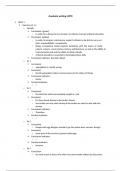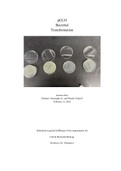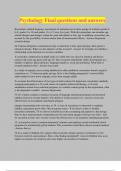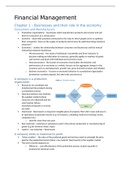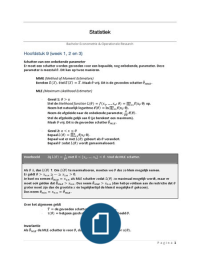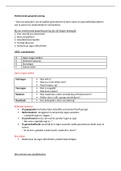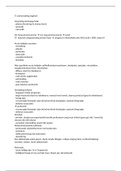Two marks questions and answers
UNIT–I TRANSISTOR BIAS STABILITY
PART – A
1. Define – Stability Factor [May/June – 12], [Nov /Dec – 09],
[April/May –10], [May/June – 12]
i. Stability factor is defined as the rate of change of collector current IC with
respect to the collector base leakage current ICBO keeping both VBE and the
current gain β constant.
Sʹ = , with β, VBE constant
ii. Stability factor indicate the degree of change in operating point due to variation
in temperature.
Sʹ = , with β, ICO constant
Sʹʹ = |, with VBE, ICO constant
2. Why do you fix the operating point in the middle of the dc load line? [Nov 05]
In order to get the faithful amplification of the signals, operating point had to be fixed in
the middle of the dc load line.
3. What is Bias? What is the need for biasing? [ Nov-08, May-09,Nov-10, May-11, May-
13]
The proper flow of zero signal collector emitter supply voltage during the passage of
signal is known as transistor biasing.
Alternatively, the process of giving proper supply voltages and resistances for obtaining
the desired Q-point is called biasing.
The need for biasing is
To prevent thermal runaway
To achieve stability
4. Why capacitive coupling is used to connect a signal source to an amplifier?
[Nov/Dec-07]
Coupling capacitor blocks DC voltage but freely pass signal voltages. Because of this
biasing conditions are maintained constant.
Prepared by A.Devasena., Associate Professor/ ECE Page 1
,EC6304- Electronic Circuits- I III Semester ECE
Two marks questions and answers
5. Compare bias stabilization and compensation techniques. [Nov /Dec – 11]
BIAS STABILIZATION BIAS COMPENSATION
It refers to the use of resistive biasing It refers to the use of temperature
circuits which allow IB to vary, so as to sensitive devices such as diodes,
keep IC relatively constant with variations transistors, thermistors, etc., which
in ICO, β and VBE. provide compensating voltages and
currents to maintain the operating point
stable.
6. What is Thermal runaway?
The continuous increase in collector current due to poor biasing causes the
temperature at collector terminal to increase. If no stabilization is done, the collector
leakage current also increases. This further increases the temperature. The action
becomes cumulative and ultimately the transistor burns out. The self destruction of an
unstabilised transistor is known as thermal runaway.
7. What are the types of transistor biasing? [ Nov /Dec – 11]
The term biasing is defined as the process of giving proper supply voltages and
resistances for obtaining the desire Q point. The different methods of biasing are
i. Fixed Bias
ii. Voltage divider Bias
iii. Collector to base Bias
iv. Emitter feedback bias
8. What is an operating point?
When we bias a transistor, we establish a certain current and voltage conditions for the
transistor. These conditions are known as operating condition or dc operating point or
quiescent point.
9. What is the condition for thermal stability?
The required condition to avoid thermal runaway is that the rate at which heat is released
at the collector junction must not exceed the rate at which the heat can be dissipated. It is
given by
Prepared by A.Devasena., Associate Professor/ ECE Page 2
,EC6304- Electronic Circuits- I III Semester ECE
Two marks questions and answers
10. Draw the single stage self biased circuit using PNP transistor. [April /May – 11]
11. What are the advantages and disadvantages of fixed bias circuit?
Advantages of fixed bias circuit are as follows
This is a simple circuit which uses very few components
The operating point can be fixed anywhere in the active region of the
characteristics by simply changing the value of RB. Thus it provides flexibility in
design.
Disadvantages of fixed bias circuit are as follows
This circuit does not provide any check on the collector current which
increases with the rise in temperature i.e. thermal stability is not provided by
this circuit.
Since IC and β and IB is already fixed; IC depends on β which changes unit to
unit and shifts the operating points.
12. State the advantages and disadvantages of collector to base bias.
The biasing arrangements are simple since only one resistor RB is used.
Advantages of collector to base bias circuit are as follows
The value of base resistance RB can be easily calculated.
Disadvantages of collector to base bias circuit are as follows
Does not provide good stabilization
The negative feedback of resistance RB reduces the gain of the amplifier
Prepared by A.Devasena., Associate Professor/ ECE Page 3
, EC6304- Electronic Circuits- I III Semester ECE
Two marks questions and answers
13. What is the process of instability?
The transistor amplifier fails to provide faithful amplification and drives to instability state
due to
Change in collector current IC due to temperature changes
Thermal runaway
Replacement of transistor of another equivalent transistor.
14. What is the use of compensation technique in electronic circuits?
Compensation technique is the use of temperature sensitive devices such as diodes,
thermistors, sensistors etc., to stabilize the operating point instead of d.c. biasing circuits.
15. What do you understand by dc load line?
It is the line on the output characteristics of a transistor circuit which gives the values of IC
and VCC corresponding to zero signal.
16. What is DC load line? How is Q point plotted on the DC load line? [Nov / Dec – 12]
i. The line joining the ICMAX and VCEMAX in the output characteristics of a transistor is
called DC load line.
ii. The optimum Q-point is located at the midpoint of the DC load line between the
saturation and cutoff regions. In order to get faithful amplification, the Q point must
be within the active region of the transistor.
Ic(mA
(VCEQ,
VCE(V)
VCEM
Prepared by A.Devasena., Associate Professor/ ECE Page 4



